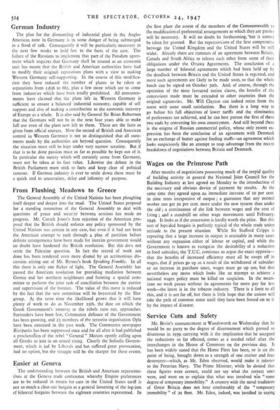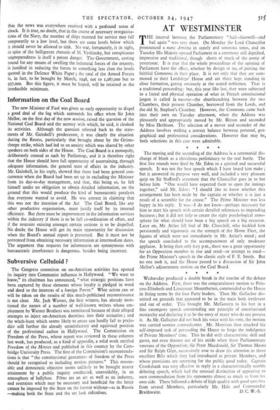Service Cuts and Safety
Mr. Bevin's announcement• at Wandsworth on Wednesday that he would be no party to the degree of disarmament which proved so disastrous in 1939, carrying with it the implication that he accepted the reductions so far effected, comes as a needed relief after the interchanges in the House of Commons on the previous day. It has been widely stated that the Home Fleet has been, or is on the point of being, brought down to a strength of one cruiser and four destroyers—which, as Mr. Eden observed, would make it inferior to the Peruvian Navy. The Prime Minister, while he denied that these figures were correct, could not say what the correct ones were, and went on to explain that what was involved Was some degree of temporary immobility." A country with the naval traditions of Great Britain does not hear comfortably of- the "temporary immobility " of its fleet. Mr. Eden, indeed, was justified in saying that the news was everywhere received with a profound sense of shock. It is true, no doubt, that in the course of necessary reorganisa- tions of the Navy, the number of ships manned for service may fall temporarily to a low level, but there are some levels below which it should never be allowed to sink. No war, fortunately, is in sight, in spite of the belligerent rhetoric of M. Vyshinsky, but conspicuous unpreparedness is itself a patent danger. The Government, casting round for any means of swelling the industrial forces of the country, is justified in reducing the forces to something less than the levels quoted in the Defence White Paper ; the total of the Armed Forces is, in fact, to be brought by March, 1948, not to 1,087,000 but to 937. But this figure, it must be hoped, will be retained as the irreducible minimum.

































 Previous page
Previous page